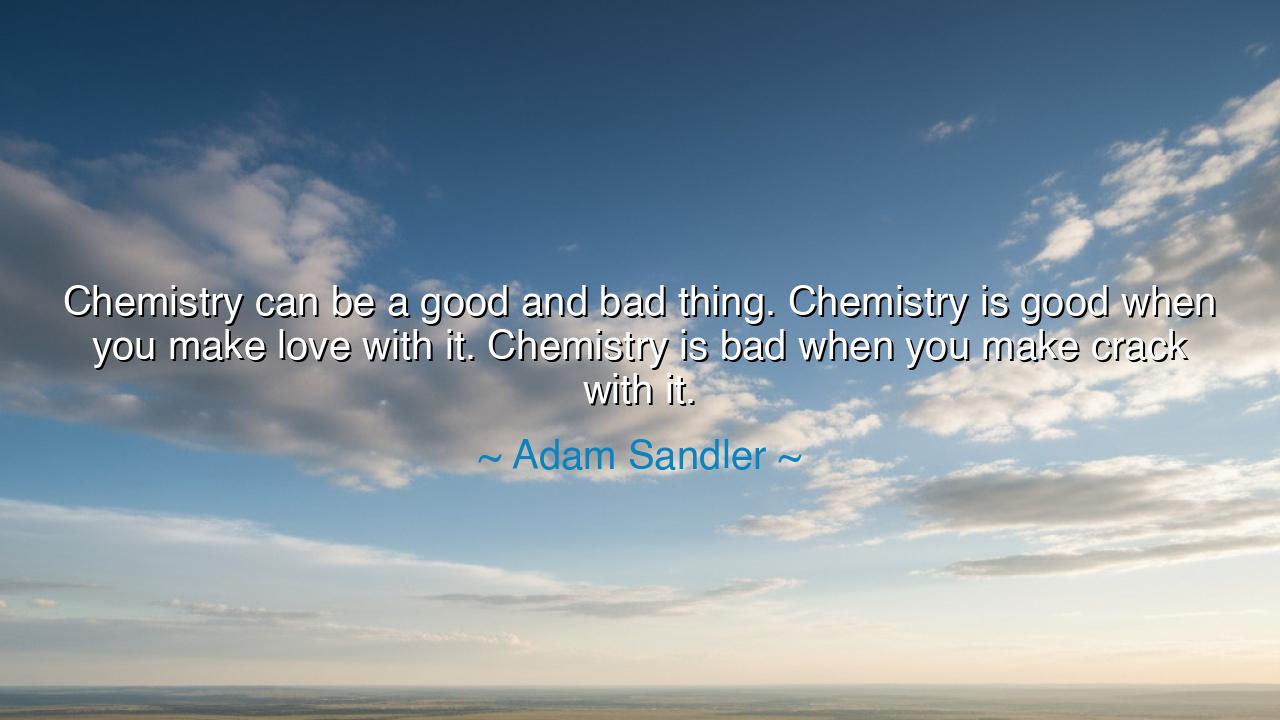
Chemistry can be a good and bad thing. Chemistry is good when you
Chemistry can be a good and bad thing. Chemistry is good when you make love with it. Chemistry is bad when you make crack with it.






“Chemistry can be a good and bad thing. Chemistry is good when you make love with it. Chemistry is bad when you make crack with it.” Thus spoke Adam Sandler, a man known for his humor, yet within whose jest lies the wisdom of the ages. For laughter often carries truth more profound than solemn philosophy. In these few words, Sandler speaks not only of the science of chemistry, but of the dual nature of all human creation — that every power granted to us by knowledge or passion can be turned toward either love or destruction. What he names “chemistry” is, in truth, the elemental fire of existence itself — the power to create and to destroy, to heal and to harm.
To understand this saying is to see that chemistry represents not merely the study of substances, but the very forces that bind the world together — the spark between atoms, the connection between people, the energy of life itself. Sandler, in his characteristic simplicity, reminds us that the same spark that can forge intimacy and tenderness can also ignite ruin. In this way, he speaks of the eternal balance of human nature: our inventions, emotions, and passions are neither holy nor wicked in themselves; it is the heart of the one who wields them that decides their fate. Thus, all power — whether of science, love, or art — is sacred when guided by wisdom, and perilous when corrupted by greed or despair.
History itself bears witness to this truth. Consider Alfred Nobel, the inventor of dynamite. He discovered it not for war, but for construction — to build roads, to open mountains, to serve progress. Yet his creation was turned to destruction, used by armies to tear apart what it was meant to build. The same chemistry that could shape a tunnel through rock became a weapon that tore men to pieces. Stricken with remorse, Nobel left his fortune to honor those who serve peace — the Nobel Prize — proving that the line between good and evil lies not in the substance, but in the soul that commands it.
And so it is with love as well. When Sandler speaks of “making love” through chemistry, he evokes the sacred harmony between two human beings — the natural fusion of body and spirit that reflects the creative power of the universe. Love, in its purest form, is a kind of alchemy: two separate lives transformed into one living flame. It is the highest and most life-giving expression of chemistry — connection, unity, the celebration of being alive. Yet when the same fire is twisted by addiction, hatred, or lust for power, it becomes the crack of the spirit, the poison that eats away at joy and peace. Thus, chemistry is not the master, but the mirror — it reflects back to us our own intentions.
The ancients would have called this truth the law of balance. Fire warms the hearth, but also burns the home. The sea gives life and yet can drown. Love heals, yet when corrupted by obsession, can destroy. What Sandler names in jest is the same lesson spoken by philosophers and prophets across time: that every force of nature, whether within or around us, carries both the seed of salvation and the seed of ruin. The wise learn to cultivate harmony; the foolish are consumed by excess.
Even in the modern world, this truth remains. The atomic age gave us both energy and annihilation. From the same science that brought light to cities came the bomb that darkened the skies of Hiroshima. Humanity continues to walk the line between progress and peril, between creation and catastrophe. Sandler’s words, humorous as they are, hold a mirror to this truth — that all greatness and all tragedy begin with the same element: the chemistry of human intent.
So, my child, take this wisdom into your heart: every power you hold — your knowledge, your passion, your strength — can become either a blessing or a curse. Choose always the path of creation over destruction, of compassion over craving. Let your chemistry serve life, not ruin it. Seek to build, to love, to heal. For the world gives to each of us the same materials — the fire of knowledge, the desire of the heart, the energy of the soul — and it is our choice that determines whether they become the tools of light or the instruments of despair.
And remember this: the greatest chemistry of all is love — the energy that unites all living things. Use it well, and you will illuminate the world around you. Use it wrongly, and you will darken even your own soul. As Adam Sandler’s humble wisdom reminds us, the secret of life is not in avoiding power, but in mastering it with purpose — to make of the elements not a poison, but a promise. For chemistry, like love itself, is divine when it creates, and infernal only when it destroys.






AAdministratorAdministrator
Welcome, honored guests. Please leave a comment, we will respond soon